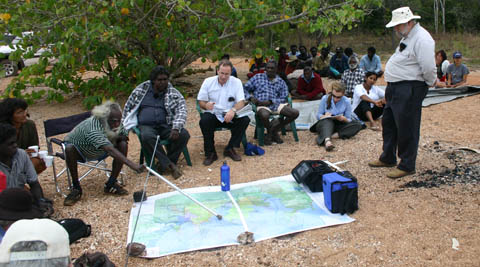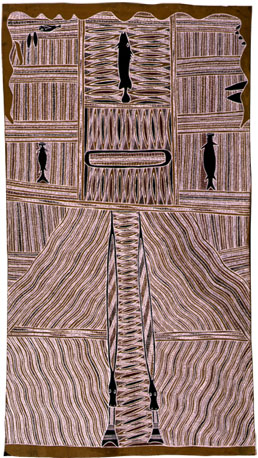
Sea rights
 |
|
Garwirrin Gumana showing
Justice Selway siginifcant areas of sea country on a map during
the court hearing at Yilpara. |
|
The Saltwater bark paintings were the first step in a campaign to educate outsiders about Yolŋu knowledge of sea country and the sacred significance of certain places. Following the decision to paint these barks, a number of legal developments lead Yolŋu to take their campaign one step further. Yolŋu clans from the Blue Mud Bay area initiated a native title case in the Federal Court to gain recognition of their sea rights under Australian law. The first hearings took place at Yirrkala and Yilpara, a homeland centre on Blue Mud Bay.
 |
A number of the Saltwater paintings, by Gawirrin Gumana, Djambawa Marawili, Baluka Maymuru and others, were used as evidence in these hearings. For the Yolŋu, these paintings are the equivalent of legal 'title deeds' to areas of land and sea. Left: A Saltwater Collection painting by Garwirrin Gumana that was used as evidence in the court case. Learn more about this painting.
|
After giving evidence at Yilpara, a group of Yolŋu leaders travelled to Canberra to observe the Federal Court hearings...
| Our interest is to come to the courts so we can hear the legal side of the Balanda (European) world, how did they see it. We know we can see the Yolŋu way ... we know those areas, but the Balanda way it's pretty hard for them to put it to Yolŋu way of thinking. One day we might have the right way of doing ... People will learn and they will come and have permits. So, we can all work together, you know, live and look after those important areas - you know - Djalkiri (sacred sites, literally foundation). And this is what's happening here and now today. That's my interest. Djambawa Marawili | ||
Video:
Djambawa Marawili with Waka Munungurr talking outside the Federal
Court of Australia in Canberra. |
The court's initial finding was that native title did exist but that a previous decision of the High Court, that recognised the general public's right to fish and freedom to navigate, made it impossible to grant Yolŋu exclusive rights to the waters of Blue Mud Bay.
The Yolŋu appealed the decision and, in July 2008, they were finally successful in the High Court of Australia. A landmark court decision effectively gave traditional owners the right to control all access to their coastal waters between the low and high tide mark along 80 per cent of the Northern Territory's coastline.
![]() News update: ABC report Wed Jul 30, 2008: Traditional owners get exclusive rights over tidal waters.
News update: ABC report Wed Jul 30, 2008: Traditional owners get exclusive rights over tidal waters.